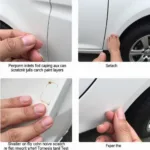Modern vehicles are increasingly reliant on sophisticated electrical systems. From the engine control unit to power windows, car electric parts are essential for functionality, comfort, and safety. When these components malfunction, diagnosing and repairing the issue requires specialized knowledge and tools. This guide delves into the intricacies of car electric parts repair, equipping you with the insights needed to navigate this complex landscape.
Understanding the Basics of Car Electric Parts
Before delving into repair intricacies, it’s crucial to grasp the fundamentals of car electric parts and systems.
- Battery: The heart of your car’s electrical system, the battery stores and supplies power to various components.
- Alternator: Working in tandem with the battery, the alternator generates electricity to power the electrical system and recharge the battery while the engine is running.
- Starter Motor: This powerful electric motor cranks the engine, setting the combustion process in motion.
- Wiring Harness: A complex network of wires, the harness acts as the nervous system, transmitting electrical signals and power throughout the vehicle.
- Fuses and Relays: These safety devices protect the electrical system from overloads and short circuits.
- Sensors: Modern vehicles are equipped with numerous sensors that gather data on various parameters, such as engine temperature, speed, and throttle position, and relay this information to the electronic control units (ECUs).
- Electronic Control Units (ECUs): The brains of the electrical system, ECUs receive data from sensors and regulate various functions like engine performance, transmission shifting, and safety features.
Common Car Electric Parts Problems
From flickering headlights to a complete engine shutdown, electrical problems can manifest in diverse ways, often leaving car owners perplexed. Here are some common issues:
- Battery Problems: A dead battery, often due to age or a faulty alternator, is a frequent culprit for starting issues.
- Alternator Malfunctions: A failing alternator can lead to a drained battery, dimming headlights, and other electrical glitches.
- Starter Motor Failure: When the starter motor malfunctions, the engine might not crank or could produce a clicking sound.
- Wiring Issues: Damaged, corroded, or loose wiring can disrupt the flow of electricity, causing a range of electrical problems.
- Sensor Malfunctions: Faulty sensors can send inaccurate data to the ECUs, leading to poor engine performance, reduced fuel efficiency, and illuminated warning lights on the dashboard.
Electric car window repairs midrand and Other Common Electrical Repairs
Many car owners face issues with their electric windows, especially in older vehicles. Here’s a glimpse into this common repair:
- Diagnosing the Issue: A qualified technician will first pinpoint the root cause. This might involve checking the window switch, the window motor, or the wiring and connections within the door.
- Repairing or Replacing Components: Depending on the diagnosis, the technician will repair or replace the faulty components, ensuring the smooth and safe operation of the electric windows.
Beyond electric windows, car electric part repairs encompass a wide range of services, including:
- Battery testing and replacement
- Alternator repair or replacement
- Starter motor repair or replacement
- Wiring harness inspection and repair
- Fuse and relay replacement
- Sensor diagnosis and replacement
- ECU diagnosis and repair or replacement
The Importance of Professional Car Electric Parts Repair
While some minor electrical issues might seem DIY-friendly, it’s crucial to remember that modern car electrical systems are complex and interconnected. Attempting repairs without proper knowledge and expertise can exacerbate the problem, leading to costly damage or even safety hazards.
Here’s why entrusting your car electric parts repair to professionals is paramount:
- Accurate Diagnosis: Experienced technicians possess the knowledge and specialized diagnostic tools to accurately pinpoint the root cause of electrical problems, eliminating guesswork and unnecessary repairs.
- Safety First: Working with high-voltage electrical systems can be dangerous. Professionals are trained to handle these systems safely, minimizing the risk of electrical shocks or damage to the vehicle.
- Quality Repairs: Reputable repair shops use high-quality parts and follow industry best practices, ensuring durable and reliable repairs that stand the test of time.
Car electric motor repairs and the Rise of Electric Vehicles
With the automotive industry embracing electrification, car electric motor repairs are gaining prominence. Here’s a brief overview:
- Electric Motor Fundamentals: Electric vehicles (EVs) utilize electric motors to convert electrical energy from the battery into mechanical energy, propelling the vehicle.
- Common Electric Motor Issues: While generally robust, electric motors can experience issues with bearings, windings, or the motor controller, affecting performance and range.
- Specialized Expertise: Repairing EV electric motors requires specialized knowledge, tools, and training.
Conclusion
Car electric parts are essential for the operation of modern vehicles. When electrical issues arise, seeking professional help is crucial for accurate diagnosis, safe repairs, and optimal vehicle performance. By understanding the basics of car electrical systems and recognizing the importance of expert assistance, you can ensure your vehicle remains reliable and safe on the road.



